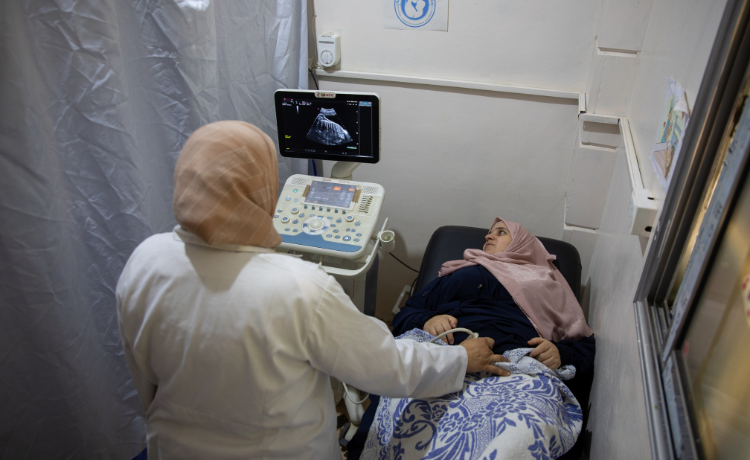News
Journeys of motherhood and hope in northwest Syria
- 17 September 2024
News
IDLIB, Syrian Arab Republic – “I felt lost, because I couldn’t get pregnant,” said Alaa Nabeel from Idlib Northwest Syria. After suffering two miscarriages in three years, she was wracked with grief.
Dr. Nabeel is a general practitioner at the Medina Maternity and Neonatal Hospital in Idlib. Less than a year after her second miscarriage, she discovered she was pregnant again. Scared of reliving the pain of her previous experiences, she turned to the team at the Medina Hospital for support.
Amna Al Bakkour had been treating her for the past three years and reassured her that there were no significant health issues that had led to the miscarriages. Dr. Nabeel’s condition was closely monitored and she underwent a series of tests. “Without the support I received from the team, I could not have had a baby,” she told UNFPA, the United Nations sexual and reproductive health agency, which supports the hospital.
Dr. Nabeel had experienced profound anxiety and fear throughout her pregnancy, but the hospital also provided mental health care. “Ninety per cent of her treatment was down to psychological support,” said Dr. Al Bakkour, who ensured her patient could speak to a psychiatrist and receive help to learn healthier coping methods.
Comprehensive maternity care

The Medina Hospital is a vital health-care facility for over 110,000 people in the area, mainly those who have been forced from their homes into other, already deeply impoverished communities. As well as maternity care and psychological support, there is a team dedicated to gender-based violence response and protection.
Years of conflict, economic volatility and insecurity have taken a devastating toll on the Syrian health system, straining medical supplies and overwhelming the capacity of health workers. Facilities such as the Medina Hospital are therefore crucial in supporting the urgent needs of millions of women and girls like Dr. Nabeel, who gave birth to a baby girl in August 2023. Over 3,000 patients are received every month, seeking assistance from regular deliveries and Caesarian sections to family planning and antenatal consultations.
At the nearby Idlib Maternity Hospital, which is also supported by UNFPA, Khansa Harbeh, a 35-year-old mother of two, was experiencing complications in her third trimester. “I was terrified and desperately searched for a well-trained doctor who could handle my case,” she said.
Abdul Aziz Hamza, an obstetrician at the hospital, explained that the placenta had detached from her uterus prematurely – a condition that can quickly turn life threatening. “Placental abruption is an emergency that requires immediate intervention,” he told UNFPA. “We knew we had to act fast to save both the mother and her baby. The situation was critical, but we were prepared.”
Ikram Haboush, the hospital’s director, added, “Many women in northwest Syria lose their lives while being transferred between hospitals that lack essential supplies.”
Luckily this wasn’t the case for Ms. Harbeh. “The maternity hospital had everything I needed,” she said. “Without them, I don’t know what would have happened to me and my baby.”
A complex crisis for women and girls

As conflict, insecurity and increasing climate disasters disrupt access to family planning, safe birth and protection services, women and girls in Syria face greater risks of preventable maternal deaths and unintended pregnancies, as well as child marriage and other forms of gender-based violence.
An estimated 16.7 million people are in need of urgent support across the Syrian Arab Republic – the highest number since the crisis began in 2011. In Idlib and northern Aleppo alone, 70 per cent of all residents are displaced, with more than 2 million living in camps or informal accommodation sites; nearly 80 per cent of them are women and children.
Ms. Harbeh’s and Dr. Narbeel’s stories are just two among many in which skilled maternity care makes the difference between life and death. Currently, 59 emergency obstetric and neonatal care facilities are operational but half of them have already run out of funds.
Some $23 million is needed every year to address the funding gap for these hospitals and prevent pregnant women from facing the grim, life-threatening reality of giving birth without essential medical care.
